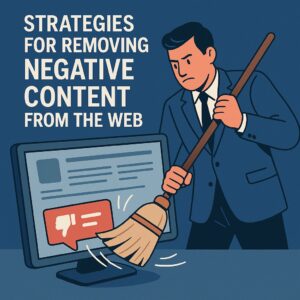Reputation is everything in business. It does not matter if you are running a fancy tech startup or selling vintage sneakers online. What people see (and say) about you becomes your business card to the world.

“But it is not just about what you post. The internet is a wild place, and sometimes random strangers or salty ex-customers drop nasty, made-up stuff on sites you do not even control,” says Nalini Prasad, Chief Strategy Officer at BluShark Digital.
However, you are not powerless. There are several ways to counteract and enhance your digital reputation. Stick around for some solid, real-world hacks you should use if you are in a negative content mess.
Reporting Community Guidelines Violations
Every platform has its rules these days, some stricter than others. The goal is to keep things fair and not let trolls run wild.
If you stumble across something nasty that breaks the rules, do not scroll by. Hit that “Report” button or send a message to their support team. The more receipts you have (screenshots, links, whatever), the better.
Remember, you cannot simply say, “This is bad.” You must specify exactly what is wrong. Moderators lurk ready to remove content that crosses the line. If you give them all the details, garbage disappears faster.
Negotiation and Mediation
Hitting the report button does not always resolve your problems. Sometimes you have to take matters into your own hands and talk to people.
If you think the person behind the nasty comment or bad review might be open to a real conversation, why not try it? Half the time, it is just a misunderstanding taken out of context. People love drama online, but most issues can be resolved if you listen. It’s better to reach out nicely, not with guns blazing.
Common ground is your friend here. If things get awkward or you are just not getting anywhere, consider bringing in a neutral third party to keep things fair (think referee, but less officious). A brief, honest conversation can save everyone from online chaos.
Court Orders
Sometimes, online disputes escalate beyond reporting buttons or friendly talks. If the harmful content is severe, such as defamation, false accusations, or harassment, you may need legal assistance.
A court order can compel platforms to take down damaging material. This typically involves filing a lawsuit to demonstrate how the content violates laws or harms your reputation. Once granted by a judge, companies like Google or Facebook must remove flagged content.
This route is more serious and costly, but can be essential in tackling deeply damaging situations when other methods are insufficient.
Search Engine Suppression
When removal is not an option, pushing harmful content down search rankings can work.. Users typically stop on the first page of results.
Start creating fresh, positive marketing content that aligns with your brand or personal name. Blogs, social media posts, press releases, and interviews are all effective options. Utilize effective SEO practices, such as targeting relevant keywords, to ensure this new material ranks higher than damaging pages.
Tools like Google Ads can also boost visibility for positive links at the top of searches. While it does not erase negativity, burying it reduces its impact significantly on public perception.
Leveraging Expert Help
Dealing with nasty stuff online can be a headache. That is why bringing in pros like BluShark Digital is a game-changer. These marketing experts live and breathe online reputation rescue missions. They do not just sweep the problematic stuff under the rug; they pump up your bright side and drown out all the noise.
No more crossing fingers and hoping for the best. These guys handle the heavy lifting. Call us today and get a plan that fits your situation, and start reclaiming your digital space.